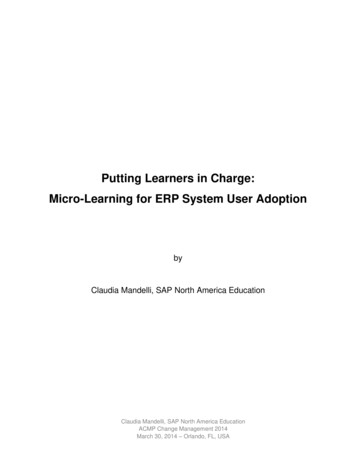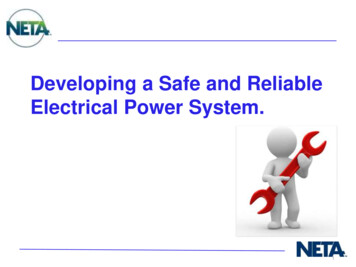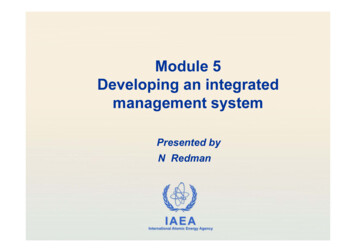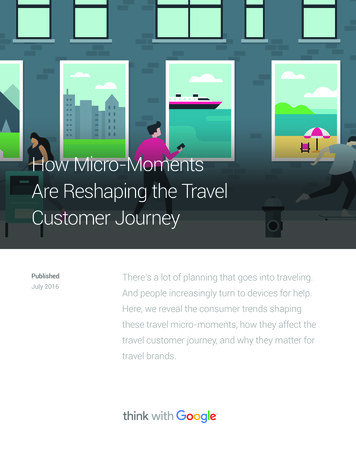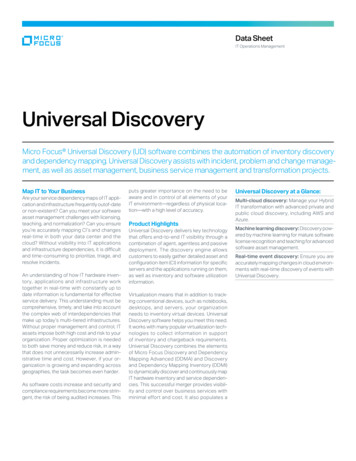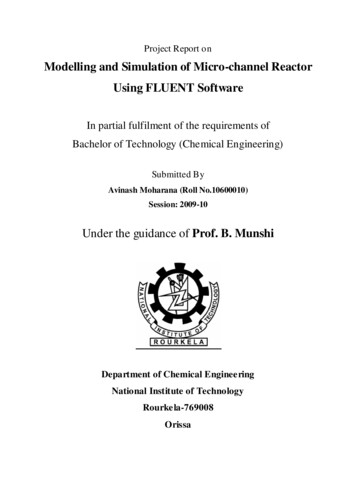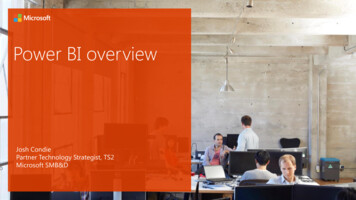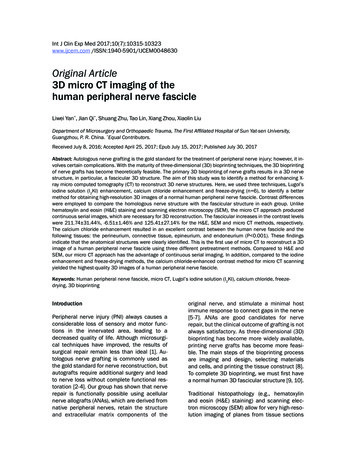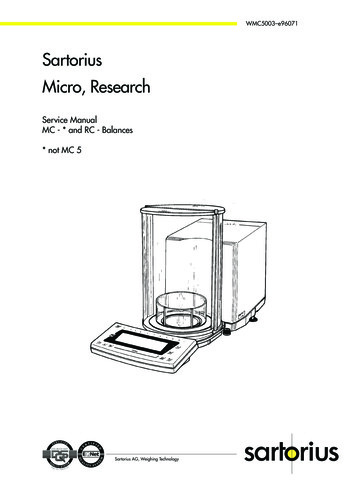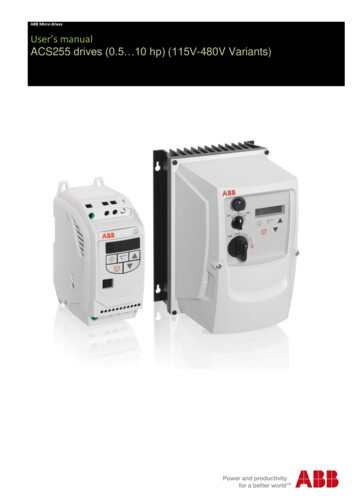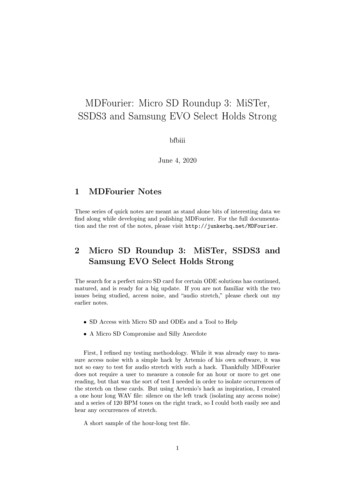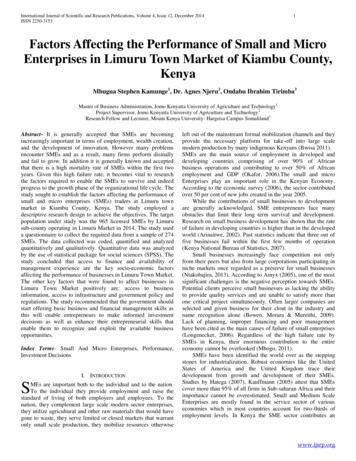
Transcription
Developing a Systemof Micro-credentials:Supporting Deeper Learning in the Classroom
OverviewWhat aremicro-credentials?. 3What is Deeper Learning?. 5What are Deeper Learningmicro-credentials?.13What is next?. 20The fine print.back
What Are EducatorMicro-credentials?Teachers earn credentials at the beginning of their careers, but they learn new skillsevery day. While teachers are recognized for the time they spend in formal professionaldevelopment settings, they often don’t have the opportunity to demonstrate the fullbreadth of what they have learned, including in informal contexts.To address this, Digital Promise is building a system of micro-credentials to provideprofessional educators a new way to identify competencies they are developing and gainrecognition for the skills they learn throughout their careers.We can move to a competency-basedsystem of professional F COMPETENCESource: g-Paper.pdfN TI A L SMULTIPLE WAYSTO LEARNDeveloping a System of Micro-credentials3
What Are EducatorMicro-credentials?Bite-sized—focused on a specific, observable competencySubject-adaptable—can usually be adapted to multiple subject areas tosupport college and career-ready standardsResearch-based—grounded in educational researchTeacher- and student-centered—teachers can be selected based on thespecific and relevant needs of studentsPersonal and timely—supports professional growthPortable—can be shared as digital badges in online platformsTransparent—supported by publicly available, accessible content,including criteria for assessmentPerformance-based—demonstrated through artifacts, such as: Lesson, project, and unit plansStudent work samplesTeacher and student reflectionsObservationsVideos of teacher and student interactionPeer and self evaluations and reviewsDeveloping a System of Micro-credentials4
What is DeeperLearning?“Deeper Learning” is an umbrella term for the skills, understandings, and mindsetsstudents must possess to succeed in today’s jobs and civic life. At its heart, DeeperLearning is defined by a set of competencies students must master to develop akeen understanding of academic content and apply their skills to challenges in theclassroom, on the job, and in everyday life.Why does DeeperLearning matter?Deeper Learning is for ALL students —providinga solid foundation for lifelong learning.Deeper Learning provides a framework throughwhich ALL students can develop the criticalskills they will need to succeed in college,in the workforce, and as lifelong learners.By engaging with Deeper Learning competencies,students become more motivated and able toapply what they have learned across subjectareas and topics, helping them master thecontent and retain what they have learned.Developing a System of Micro-credentials5
HISTORYFramework forDeeper LearningDeeper Learning is comprised ofsix categories of strategies that are essentialfor students to achieve at high levels. Byengaging in Deeper Learning, studentswill master academic content, developknowledge, skills, and academic mindsets,and learn more efficiently.
Framework forDeeper Learning1Master coreacademiccontentClearly state why the contentmatters.Explain and/or demonstrate thecore facts and concepts of thesubject, how they relate to yourwork, and how they relate to eachother.HISTORYUse and apply the core processesand procedures that are commonpractice in the subject.Transfer your knowledge of thecore facts, concepts, processes, andlanguage to a novel context.Developing a System of Micro-credentials7
Framework forDeeper Learning2Think criticallyand solve complexproblemsAnalyze and develop a complex question,problem, issue, or perspective and identify itsrelevant parts or dimensions.Consider possible approaches to a question,problem, issue, or perspective and generatea hypothesis and action plan.Recognize the facts, concepts, processes,and language you need to learn to addressthe question, problem, issue, or perspective,and use effective strategies to acquire them.Evaluate the reliability and validity of newinformation, evidence, and ideas frommultiple sources and perspectives.Support your hypothesis or position withgood evidence and logical reasoning.Carry out your action plan and when yourapproach is not working, persist, adjust, andtry something different.Seek out and positively respond to critiquesof your ideas, and give kind and specificfeedback to others.Purposely reflect on your process and yourwork.Developing a System of Micro-credentials8
Framework forDeeper Learning3WorkcollaborativelyContribute relevant knowledge,skills, and ideas to the groupand listen carefully to others’contributions.Encourage and build on a range ofideas from the group.Identify why your individualresponsibilities matter to the group’swork and why you should completethem in a timely manner.Work with the group on an actionplan that has specific goals anddistributes the work fairly.Help the group work productivelytoward its goals, resolving conflictswhen necessary.Give feedback to others in thegroup about their collaboration andintegrate their feedback into youractions.Work with the group to assessprogress toward its goals.Developing a System of Micro-credentials9
Framework forDeeper Learning4CommunicateeffectivelyIdentify your target audience and itscharacteristics and needs.Create messages that are clear,accessible, and useful to youraudience.Concisely state the main idea andpurpose of your message.Communicate your meaning in bothwritten and oral form.Choose a communication form thatsuits your audience and purpose.Consider feedback from reliablesources and respond to questions,critiques, counterarguments, andsuggestions.Offer kind, specific, and helpfulfeedback to others.Developing a System of Micro-credentials10
Framework forDeeper Learning5Learn howto learnSeek out intellectual, creative, andpersonal challenges that lead togrowth and learning.Set goals and keep track of progress.Recognize what you don’t knowor understand and find strategiesor support from others to help fillthose gaps.Seek feedback for improvement.Treat mistakes as opportunities tolearn.Use revisions and reflections togrow and learn.Developing a System of Micro-credentials11
Framework forDeeper Learning6DevelopacademicmindsetsSeek out academic challenges thatlead to growth and learning.Identify the relevance and value ofthe academic work.Take initiative and show effort inyour work.Persist despite difficulties.Show increasing autonomy in yourwork.Build helpful relationships andaccess the support and resourcesyou need.Consider ethical values in alldecision making and behavior.Developing a System of Micro-credentials12
Deeper LearningMicro-credentialsDigital Promise embarked upon a mission to determinehow teachers can demonstrate and be recognized for theirability to engage students in Deeper Learning.There are 40 micro-credentialsthat can be mapped to the six indicators of Deeper Learning.For Deeper Learning,research suggeststhat student work isthe most powerfulartifact of mastery.Developing a System of Micro-credentials13
Deeper LearningMicro-credentials1Master core academic contentMaking Projects Real—knowing and practicing theessential activities of each stage of a project to improvestudent learning and support successful outcomes forlearning projects.Mapping Facts—creating visual maps of what studentsthink are the key facts in a topic to be learned, beforeand after study, to see the effects of the learningprocess and to deepen learning.Mapping Processes—creating visual maps of whatstudents think are the key processes in a topic to belearned, before and after study, to see the effects ofthe learning process and to deepen learning.Mapping Concepts—creating visual maps of whatstudents think are the key concepts in a topic to belearned, before and after study, to see the effects ofthe learning process and to deepen learning.Developing a System of Micro-credentials14
Deeper LearningMicro-credentials2Think critically and solve complex problemsProductive Researching—using astructured approach to get the mostout of finding, evaluating, and usinginformation in the research process.Effective Reasoning—using a timetested, logical scientific reasoningprocess to develop and test ahypothesis related to a learningchallenge.Systems Thinking—understandinghow connections and feedback loopswork in complicated systems tobuild systems thinking and complexproblem-solving skills.Idea Generating—enhancing creativethinking and idea generation througha well-structured set of processes thatboth expand and deepen learning.Evaluating Online Information—distinguishing fact from fiction, prooffrom persuasion, and authority fromadvertising to assess the credibilityand reliability of online information.Evidence-backed Positions—engaging in learning projectsthat build a number of essentialcommunication, critical thinking, andother Deeper Learning skills, suchas researching, analyzing, clarifying,categorizing, prioritizing, questioning,explaining, defending, and mostimportantly, building a case withstrong evidence to support a position.Kind Critiquing— offering feedbackthat is timely, specific, actionable,and positive to increase motivationto deepen one’s learning.Practicing Reflection—reflecting onone’s learning before, during, andafter learning activities.Sound Decision-making—taking thetime to fully explore the options andpossible outcomes of decisions, withdiscussions and reflections from others,to make better and deeper decisions.Creative Problem Solving—enhancing the process of devisingcreative solutions by incorporatinga variety of perspectives and usingdiffering views to stimulate a moreunexpected, innovative solution.Analyzing Media Impacts—analyzingand understanding how mediamessages are intentionally crafted toproduce specific audience responsesto become more media literate, betterable to choose media for learninggoals, and better able to craft effectivemedia messages.Designing Effective Solutions—using a tested design anddevelopment project methodologyto create an effective solution to aproblem.Developing a System of Micro-credentials15
Deeper LearningMicro-credentials3Work collaborativelyProductive Teamwork—creating an upfront Team Agreementto set goals and expectations for how teamwork will happenin a project.Getting Help & Support—practicing positive strategiesfor seeking help and finding support to enhance students’social support networks and increase their motivation andopportunities for lifelong Deeper Learning.Belonging & Caring—having a regular time to check in witha consistent group of peers and adults and share what’shappening in their lives in order to build students’ sense ofbelonging.Managing Project Cycles—knowing and practicing theessential activities of each stage of a project to improvestudent learning and support successful outcomes for learningprojects.Collaborative Problem Solving—working together throughfour stages of a problem-solving challenge to design solutionscollaboratively.Resolving Conflicts—understanding each team member’sconflict resolution style to develop effective strategies to resolvedifferences of opinion or approach among members of a team.Effective Leadership—practicing proven student leadershipstrategies and methods.Practicing Open-mindedness—actively searching for evidenceagainst one’s favored beliefs, values, plans, or goals; weighingsuch evidence fairly: and considering alternative perspectives todeepen one’s understanding of and empathy for diverse pointsof view.Developing a System of Micro-credentials16
Deeper LearningMicro-credentials4Communicate effectivelyClear Thinking & Writing—having clear goals andusing proven strategies to clarify thinking andwriting to increase the effectiveness of both writtencommunications and the learning process.Active Listening—being thoughtful about the reasonfor listening and using proven listening strategiesbefore, during, and after the listening experience to getmore out of presentations.Persuasive Presenting—clearly and convincinglypresenting ideas to others to connect deeply, bothemotionally and thoughtfully, with an audience and topromote Deeper Learning for both the presenter andthe audience.Personal Purpose—having a sense of positive purpose,meaning, and direction for one’s learning, work, andlife to increase motivation, resilience, and sense offulfillment.Choosing Technology Tools—thoughtfully choosingthe right technology tool for the learning task at handfrom the vast array of choices available.Cultural Competence—developing a position onan intercultural issue by exploring multiple culturalperspectives, then acting to support this position in ameaningful way.Developing a System of Micro-credentials17
Deeper LearningMicro-credentials5Learn how to learnDesign Thinking & Doing—applying both designthinking and a proven, multistage design anddevelopment process to create an innovative andentrepreneurial solution to a problem.Self-reliance & Autonomy—developing the ability tothink, feel, and make decisions on one’s own and toguide one’s own learning through a variety of learningstrategies that put students in the center of theirlearning and their lives.Choosing Learning Strategies—matching learninggoals with appropriate learning strategies for powerfullearning and personal empowerment.Crafting Driving Questions—using proven inquirystrategies to motivate and guide Deeper Learning.Developing a System of Micro-credentials18
Deeper LearningMicro-credentials6Develop academic mindsetsGrit & Resilience—developing a passion for goals, persistence to achieve them,and resilience to overcome setbacks along the way.Growth Mindset—using growth-oriented feedback and language to reinforce afocus on growth.Expressing Personal Perspectives—providing students opportunities todevelop their personal voice, increase self-confidence and self-direction,exercise their imagination and creativity, and gain transferable project skillssuch as defining, planning, carrying out, and performing their designs.Ethical Behavior—understanding new principles of digital citizenship andtimeless universal ethical values to guide students in building a personal set ofethical values and behaviors.Mindfulness—developing an expanded self-awareness, through focusedattention on the present moment, of the unfolding experiences of one’s body,breathing, sensations, thoughts, and feelings, and from this center of calmness,actively serving others with empathy and gratitude.Seeking Well-being—developing one’s physical, mental, and spiritual wellbeing through regular practice to develop lifelong health and wellnesspractices and deeper, more joyful learning.Developing a System of Micro-credentials19
What is Next?Deeper Learning is just the beginning.Digital Promise is launching a platform to support teachersin earning these Deeper Learning micro-credentials.The future is limitless for micro-credentials, and we seekpartners to develop micro-credentials associated with:mone Com athtotgdsTeachin tate Standar sSnCore s grade ba dvariouduse tscfonng studeiten rglem rts fo arnin spoeIm pp th l ncesu wi erediffUsing tspecific eacher protocolsmanagement st andrategiesUsingtechnology tosupport studentlearningDesigninclassro g and implemom-based re entingsearchhing andDeveloping coac skillsipteacher leadershUsing datresearch a andinclassroo them
The Fine PrintReceipt of a micro-credential is not a guaranteeof teacher quality —it is a signal of competencywith a specific skill.Teachers own their artifacts and controlwhen and where they are shared.Digital Promise would like to acknowledge Bernie Trilling, Alfred Solis, Barbara Bray, Barnett Berry,Ben Sanoff, Robert Goodman and the New Jersey Center for Teaching and Learning, Bob Lenz,Erika Nielson Andrew, Jim Rickabaugh, and Pat Deklotz. Support provided by The William & FloraHewlett Foundation.For more information, please visit: www.digitalpromise.org/microcredentials
Learning? “Deeper Learning” is an umbrella term for the skills, understandings, and mindsets students must possess to succeed in today’s jobs and civic life. At its heart, Deeper Learning is defined by a set of competencies students must master to develop a keen understanding of aca
